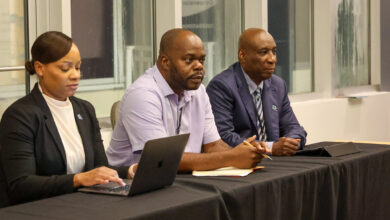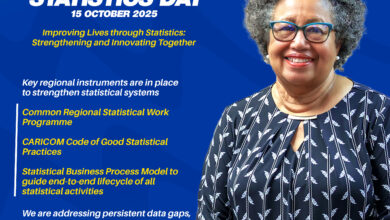Hon. Attorney General
Hon. Minister of Legal Affairs
Specially Invited Guests
Distinguished Participants
Ladies and Gentlemen of the Media
Distinguished Ladies and Gentlemen
As Secretary-General of the Caribbean Community, I am deeply appreciative of the opportunity afforded me to express a few thoughts on the occasion of this important milestone in Caribbean development
Already we have by the Honourable Attorney General of Trinidad and Tobago which would not only have removed any erroneous perceptions regarding the Caribbean Court of Justice but would also have enlightened us about its history and its promise. For that I would like to thank the Honourable Attorney General especially as she has thereby made my task much easier.
Today, the Community takes a major step forward in creating the CARICOM Single Market and Economy as the Government of Guyana joins Saint Lucia and Barbados in depositing its instrument of ratification for the establishment of the Caribbean Court of Justice – a foundation pillar of the Single Market and Economy. These three (3) instruments satisfy the legal requirement for bringing into existence the Caribbean Court of Justice. Therefore, as the Depositary, I hereby declare the Agreement Establishing the Caribbean Court of Justice as having entered into force. Today is indeed historic and is one that should give us as a people of the Caribbean Community good reason to celebrate!
I would like to pay special tribute to those three countries whose ready ratification of the instrument establishing the Court have served to bring us to this historic juncture. And I wish in particular to pay tribute to Dr. the Honourable Kenny D. Anthony, the Prime Minister of Saint. Lucia, the Head of Government with lead responsibility for governance in the Community, who played a sterling leadership role in the establishment of the Court and whose country was the first to deposit its instrument of ratification.
High praise is also due to the Government of Barbados whose successive Attorneys General spearheaded the work of the Preparatory Committee which has been charged by Heads of Government with the responsibility of converting political decision into operational reality. Finally, high praise must also be accorded to the Government and people of Trinidad and Tobago for agreeing to provide the headquarters for the Court, demonstrating once again their steadfast commitment to Caribbean integration.
Ladies and Gentlemen, it is significant that the decisive act with respect to the establishment of the Caribbean Court of Justice is taking place here in Trinidad and Tobago. For it was here in 1973 that the Treaty of Chaguaramas was signed giving birth to the Caribbean Community itself. And, even more pertinently, it was in Trinidad and Tobago that the Federal Supreme Court of the West Indies, predecessor to this body, has its headquarters.
And like that Court, the Caribbean Court of Justice will serve to bring justice within closer reach of the average man and woman of the Region by virtue of both its regional location and its peripatetic manner of functioning, holding sessions in various capitals of the Community.
With the court now legally in existence, it remains for us to begin the process of bringing it into operation which we hope would be achieved in 2003. As you may know, the Heads of Government at their Twenty-Third Conference in Georgetown, Guyana, at the beginning of July, took a major step to this end, when they mandated the Caribbean Development Bank to raise the international capital market, US $100 million to establish a Trust Fund, the yield of which will be used to finance the operations of the Court in perpetuity, a lot of money no doubt, but there can be no price too high for justice. And indeed there are countries and organizations who have expressed their willingness to assist in various ways in the establishment and functioning of the Court. We would like to thank them.
Ladies and Gentlemen, this workshop is the fourth in a series and forms part of the public education programme which is so essential to the establishment of the Caribbean Court of Justice. Dialogue with the people of the Community who are after all prime stakeholders in this institution has been a fundamental approach leading to the establishment of this Court. From that dialogue emerged a significant number of the suggestions, many of which have been taken on board and have enhanced the final form of the institution.
In this public education exercise, special mention must be made of the integral role played by the Preparatory Committee, comprising the Attorneys General of Barbados (as Chair), Jamaica (as Vice-Chair), Trinidad and Tobago, Guyana, Saint Lucia, and St. Kitts and Nevis and the Legal Affairs Committee chaired by the Attorney General of Belize.
And so coming out of their work we are here today to take advantage of this opportunity which brings together participants from various disciplines essential to the functioning of the Court. As workers in the state sector, the importance of your role cannot be over-emphasised. Each and everyone of you and your departments are integral to the successful functioning of the Court. Remember that an efficient Caribbean Court of Justice will be the backbone of an efficient CARICOM Single Market and Economy. Confidence in the Court, in both its judicial functions and its administrative efficiency, is indispensable to the proper functioning of the Single Market and Economy. Indeed it is a sine qua non.
As recalled by the Honourable Attorney General, the call for a Caribbean Court of Justice, albeit by different names at time, has been one which has resonance with the large majority of the Community and notwithstanding whatever remaining doubts there may be, what is certain is that both advocates and doubters of the Court recognize its fundamental value to the establishment and sustainability of the Single Market and Economy. But of course the proof of the pudding is in the eating.
The indispensability of the Caribbean Court of Justice derives from the very nature of the Single Market and Economy itself. The Single Market and Economy, as you know, is aimed at the creation of a single, enlarged economic space which will support competitive production in CARICOM for both the intra and extra regional markets. It provides for free movement within the Region, not only of goods, but also of services, of capital and of skilled labour. In addition, it provides for a right of establishment, permitting the freedom to establish enterprises throughout the Community by nationals from any Member State of the Community, and to be treated no less favourably than a national of that country in which the enterprise is established. In such an arrangement, it is only to be expected that disputes will arise and it is therefore essential that the rules of the game be interpreted by one impartial tribunal rather than by separate courts throughout the fifteen (15) Member States. This is the original jurisdiction of the Caribbean Court of Justice.
The legal certainty which the Caribbean Court of Justice will bring will also serve to foster investor confidence in the Single Market and Economy – a factor of some significance in a Region so significantly dependant on foreign direct investment.
The Caribbean Court of Justice is also designed to have an appellate jurisdiction for both criminal and civil matters arising from the functioning of our courts. In this regard, as pointed out by the Honourable Attorney General, it will replace the Judicial Committee of the Privy Council based in the United Kingdom. This step it has been argued by regional legal and judicial luminaries will “complete our independence.” It may be instructive to note that between 1933 and the end of the last century some thirty-four (34) countries have ceased to use the Privy Council as their final Court of Appeal. Of the sixteen that remain, thirteen are Caribbean Countries.
Further, at a meeting in Jamaica earlier this year, the Chief Justices of the Commonwealth Caribbean agree to transmit the following to the Conference of Heads of Government:
“We as Chief Justices are of the view that the delay in establishing the Court is adversely affecting the administration of Justice in the Caribbean. The recent proclivity of Her majesty’s Privy Council to overrule previous decisions as handed down by that August Body is creating great uncertainty among members of the Judiciary. As a people we need to understand that the time is ripe for us to develop a jurisprudence indigenous and relevant to the Caribbean people.”
The time has certainly come for the Caribbean Court of Justice.
It gives our judicial system the opportunity to mirror the collective social ethos of our peoples, to be relevant and responsive and to apply their wisdom based on the values informing the content of that collective social ethos. I repeat, this is a cause for celebration.
Ladies and Gentlemen, my role here this morning is neither to exhaust the topic nor the audience on the issues relating to the Caribbean Court of Justice. Your agenda, by its issues and distinguished presenters, tells me that that is well catered for as regards education of the court. Suffice it for me to say, therefore, that it is you who will be called upon to play a most active role in ensuring the Court’s recognition and enforcement of the rights and responsibilities of Governments, organizations and citizens in our Community conferred by the Treaty. It is you who will be called upon to provide the expertise and to utilize skillfully your institutional capacity and competence to ensure the efficient operation of the Court. It is you who, as State representatives, will implement the legislation enacted by your State to ensure the free movement of people, goods, services and capital. It is you who will inspect and report, for example, on issues ranging from competition policy to consumer protection to dumping and subsidies and would have to bring such issues to the attention of your respective governments so that unfair practices may be addressed at the regional level and if necessary resolved by the Court.
Your importance therefore to the determination of the progress of the regional movement and the development of a more mature Community, cannot be undervalued. The responsibility of a strengthened Community lies with us all. As I have had cause to say before and at the risk of it being deemed my personal mantra, I repeat, “building that Caribbean structure (the Community) requires much more than the bricks supplied by the political, legal and economic masons. It requires the people of the Community to be the mortar which holds the bricks together and makes the structure sturdy”.
I hope we are all involved!
I thank you.
*****





